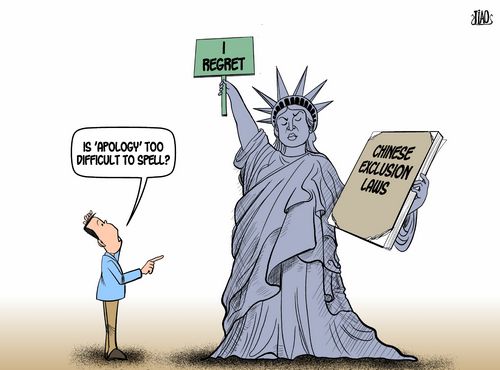US apology mends its constitutional spirit
- By Luo Huaiyu
 0 Comment(s)
0 Comment(s) Print
Print E-mail
China.org.cn, October 12, 2011
E-mail
China.org.cn, October 12, 2011
|
|
|
Long way to go [By Jiao Haiyang/China.org.cn] |
The United States Senate has recently approved by unanimous consent a resolution apologizing for its past discriminatory laws that exclusively targeted Chinese immigrants. Having been delayed for more than a century, this apology may not be substantively meaningful. Still, it has political and cultural significance, as this apology marks a progress on the road to liberty and improves the image of the U.S. internationally.
Chinese Americans deserve this apology. Their forefathers immigrated to the United States in the 19th century with a dream that is only too familiar to today's Americans – the dream of success and freedom. The entirely foreign living environment and the harsh reality of America's industrialization did not hold them back. They endured tenaciously in the face of overwhelming odds. Step by step, their diligence, benevolence, and perseverance helped them secure the least popular share of the labor market. They mined for gold, farmed the wetland, spun the yarn, and built the miraculous Transcontinental Railroad.
However, just as they were contributing their might and main to the "Manifest Destiny" of the U.S., the Chinese Americans' own destiny was made miserable by a series of politically biased designs to fence them off. The most notorious was the Chinese Exclusion Act of 1882, which provided an absolute 10-year moratorium on Chinese labor immigration, making it the first federal law in American history to proscribe entry of ethnic laborers. In the following decade the same act was passed again and eventually renewed indefinitely in 1902, thus suspending Chinese immigration for a prolonged period of time.
Such decisions not only ran counter to the creed enshrined in the Declaration of Independence and the Constitution of the United States that "all men are created equal," but also amounted to the blatant violations of basic human rights and the fundamental values of the free new world. Fortunately, Chinese Americans today have risen up to become an important part of the American society. Another undeniable fact is that their motherland has also risen up to become one of the key stakeholders of the world's future. In this sense, it can be said that we have earned the senatorial apology by ourselves.
"Justice delayed is justice denied." This epigram by British politician William Gladstone holds great truth. Even though the resolution has now been made by the U.S. Senate to offer an apology, nothing can be done to undo the pains and sufferings of hundreds of thousands of Chinese immigrants during the 19th and 20th centuries. Just as Republican Senator Scott Brown said, it "cannot undo the hurt caused by past discrimination against Chinese immigrants, but it is important that we acknowledge the wrongs that were committed many years ago." This attitude is powerful.
Indeed, it would be very wise for Americans to remember that period of history so that the same mistake does not repeat in the future. Take bilateral relations for example. Many of the decisions by the U.S. government or legislature may still be hurting the feelings of the Chinese people. Some of these are territorial; some economic; some on human rights. There can be things not so desirable on the part of China, but this gives no reason for the U.S. to unilaterally invoke punitive procedures. Frankly, some acts of the U.S. can be very provocative when China, for fear of potential clashes, has already categorized its core interests in clear terms.
In China, we have a very popular saying: "Past experience, if not forgotten, can serve as a guide for the future." The same applies to the senatorial apology, which can surely serve as a guide for the legislature's future decision-making about China. In the end, let's listen to the heart of a Chinese American who commented on www.ccgp-fushun.com in the wake of the resolution:
"It is hard for me to believe it takes so many years for this to happen. It should have been done after World War II. It should have been done after President Johnson passed the new immigration law in 1965…. I am 77 years old, been in this country from China for 61 years, and I am so glad to see this happen before I pass away."
The author is a China.org.cn columnist. For more information please visit:
http://www.ccgp-fushun.com/opinion/luohuaiyu.htm
Opinion articles reflect the views of their authors, not necessarily those of China.org.cn






